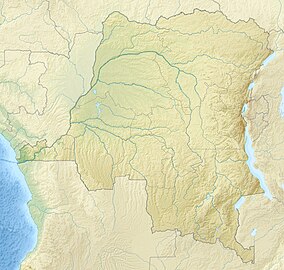Okapi Wildlife Reserve
| Okapi Wildlife Reserve | |
|---|---|
|
IUCN category II (national park)
|
|

Epulu River in the Okapi Wildlife Reserve
|
|
| Location | Democratic Republic of the Congo |
| Nearest city | Isiro |
| Coordinates | 02°00′00″N 28°30′00″E / 2.00000°N 28.50000°ECoordinates: 02°00′00″N 28°30′00″E / 2.00000°N 28.50000°E |
| Area | 13,726.25 km2 (5,299.73 sq mi) |
| Established | 1992 |
| Governing body | l'Institut Congolais pour la Conservation de la Nature (ICCN) |
| Type | Natural |
| Criteria | x |
| Designated | 1996 (20th session) |
| Reference no. | 718 |
| State Party | Democratic Republic of the Congo |
| Region | Africa |
| Endangered | 1997–present |
The Okapi Wildlife Reserve is a World Heritage Site in the Ituri Forest in the north-east of the Democratic Republic of the Congo, near the borders with Sudan and Uganda. At approximately 14,000 km², it covers approximately one fifth of the area of the forest.
The Nepoko, Ituri and Epulu rivers flow through the reserve. The imposing Mbiya Mountain overlooks the Epulu village. The reserve is home to about 5,000 okapi, 4,000 elephants, 2,000 leopards, chimpanzees and crocodiles. Other Ituri rain forest animals include forest buffalo, water chevrotain, and forest elephants. The reserve has over 300 species of bird, and is one of the most important sites for bird conservation in mainland Africa. Nomadic Mbuti pygmies and indigenous Bantu farmers also live within the reserve.
The Okapi Wildlife Reserve was created with the help of the Okapi Conservation Project in 1992. The project continues to support the reserve by training and equipping wildlife guards and by providing assistance to improve the lives of neighboring communities. The Okapi Wildlife Reserve was added to the list of world heritage sites in danger in 1997. The main threats to the reserve are deforestation, primarily caused by slash and burn agriculture, and commercial hunting for the sale of bush meat. Gold mining has also been problematic to the Reserve. As of 2005, the fighting in the eastern part of the country moved within the boundaries of the Reserve, causing its staff to flee or be evacuated. While the native Mbuti and Bantu peoples traditionally respect the forest and its wildlife, immigrants into the area do not feel the same connection to the land. Lack of funding due to the poor political and economic conditions of the Democratic Republic of the Congo has also been problematic. It is hoped that eco-tourism to the area can be developed, leading to both increased funding and improved public awareness.
...
Wikipedia

